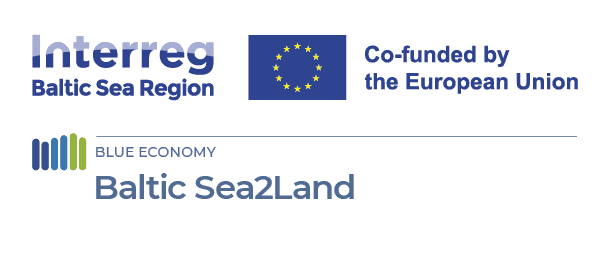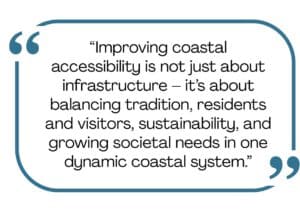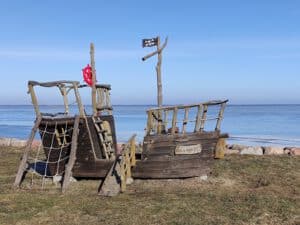
Access for All: Reimagining Coastal Accessibility in the Baltic Sea Region
12 June 2025
Access for All: Reimagining Coastal Accessibility in the Baltic Sea Region
Coastal areas are among the most valued and visited spaces. They offer opportunities for recreation, livelihoods, biodiversity, cultural expression, and well-being. However, accessibility to these spaces is increasingly challenged by a mix of environmental pressures, infrastructure limitations, and unbalanced development.
At the heart of the issue lies a fundamental cultural value in many parts of the Baltic Sea Region (BSR): everyone’s right and freedom to roam. While this tradition is widely respected, it now requires renewed commitment and safeguarding. Land privatization, unmanaged development, and a lack of clear public rights-of-way threaten to erode this principle if not addressed with care and foresight.
Moreover, coastal accessibility must be considered from both directions—not just from land to sea, but also from sea to land. Safe and inclusive access to marinas, small ports, and coastal landing points is vital for water-based tourism, recreation, and local economies. Seaward access must be integrated into spatial planning frameworks alongside land-based considerations.

Visitor numbers across the BSR’s coastal areas are rising, and so is the pressure on ecosystems and infrastructure. Seasonal peaks in tourism, increased car traffic, and underdeveloped soft mobility solutions—such as cycling and public transport—are common challenges. In parallel, growing recreational use outside the peak bathing season is expanding the functional demands on the coast, raising questions about how to balance conservation with year-round access.
As session “Coastal Accessibility: A Multi-level Perspective on Challenges and Solutions in the Baltic Sea Region” convener Anu Printsmann notes, “Improving coastal accessibility is not just about infrastructure—it’s about balancing tradition, residents and visitors, sustainability, and growing societal needs in one dynamic coastal system.”
Planning solutions showcased in the session emphasize the importance of multi-level governance, stakeholder engagement, and the use of digital tools—such as the Baltic Sea2Land Navigator—to support transparent and inclusive decision-making. Mapping access points, identifying conflict zones, integrating local knowledge into spatial strategies, and creating typical solutions for common problems in master plans are key steps toward more resilient coastal planning.
These themes will be in focus in the 5th Baltic MSP Forum session: “Coastal Accessibility: A Multi-level Perspective on Challenges and Solutions in the Baltic Sea Region”. This session invites planners, policymakers, local, municipal and national actors, civil society, and researchers to explore collaborative approaches for accessible and sustainable coasts. The 5th Baltic MSP Forum will take place on 11–12 November 2025 fully on-site in Riga, Latvia. More information and registration: www.BalticMSPForum.eu.

Author of text:
Anu Printsmann,
Tallinn University





